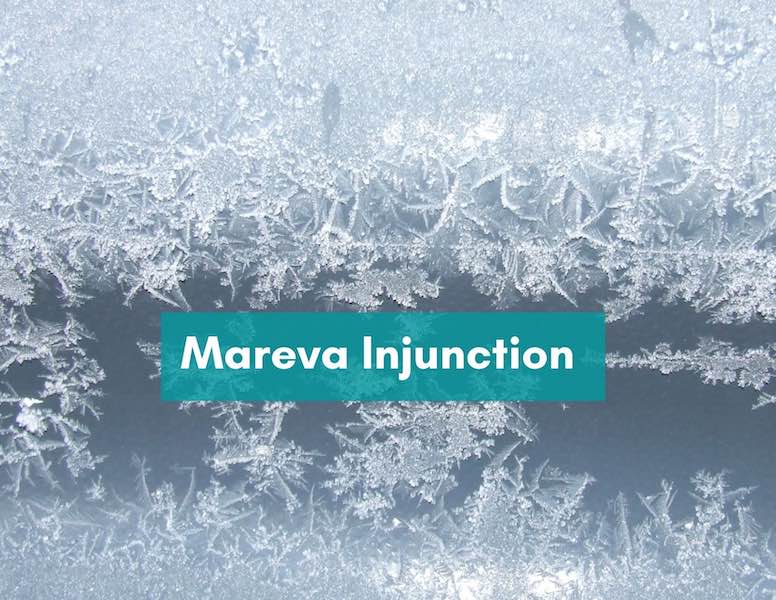Varying a Mareva Injunction (Part 1)
by Rachel Ng Li Hui ~ 29 December 2020
Introduction
When served with a Mareva Injunction, a defendant can apply to vary or discharge the same.
See: Chai Chup Seng Realty Sdn Bhd v Choo Hua Sang [1997] 2 CLJ 838.
Such variations include increasing the stipulated provisions for a defendant’s living expenses, business, and legal fees.
See: Derby & Co. Ltd v Weldon (Nos 3 and 4) [1990] Ch 65
One of the rationales for such variations is that a plaintiff who obtained a Mareva Injunction is unlike a secured creditor and thus he does not have any proprietary claim (yet) to the assets which are caught under the injunction. Therefore, a defendant has an avenue to vary such injunctions.
Angel Bell Variations
Upon an application from a defendant, third party, or a creditor, the Court may vary the Mareva Injunction ordered. In response, the Court may vary the Mareva Injunction enabling payment to bona fide debts, living expenses, business expenses, i.e. staff salaries, office expenses, and legal fees.
In Iraqi Ministry of Defence and Others v Arcepey Shipping Co SA and Another (Angel Bell) [1981] 1 QB 65, the Court allowed a Mareva Injunction to be varied so that the defendant therein can pay its debts as they fell due.
Subsequently, the term ‘Angel Bell Variation’ is coined.
The Singaporean High Court in Canadian Pacific (Bermuda) Ltd v Nederkoorn Pte Ltd & Anor [1992] 1 CLJ 721, explained that though the Angel Bell Variation allows the defendant(s) to pay creditors in the ordinary course of business, Courts must still ensure the right balance is preserved between the plaintiff and the defendant so that the Mareva Injunction will still remain effective without being an instrument of oppression.
“The Angel Bell variation, as it has come to be known, has been treated as a proper and necessary modification to enable defendants ‘to pay their trade creditors in the ordinary course as those creditors sought payment’ (K/S A/S Admiral Shipping v. Portlink Ferries Ltd. [1984] 2 Lloyd’s Rep 166 p. 167) and to permit ‘the payment of trade creditors in the ordinary course of business’ (Avant Petroleum Inc. v. Gatoil Oveseas Inc. [1986] 2 Lloyd’s Rep 236 at p. 242). But it remains important to ensure that the right balance is preserved between the rights of the parties. The injunction must not be used so as to amount to an instrument of oppression which would bring about the cessation of ordinary trading. On the other hand, the Court must have regard to the interests of the plaintiff and consider whether the variation of the injunction would involve a real risk that a judgment or award in his favour would remain unsatisfied. The Court must look at all the circumstances of the case in order to try to do justice between the parties.”
Angel Bell Variations in Malaysia
Angel Bell Variations are recognized in Malaysia. Among the cases that recognized Angel Bell Variations are Pacific Centre Sdn. Bhd. v United Engineers (M) Bhd [1984] 2 CLJ Rep 319 (“Pacific”) and Pharmmalaysia Bhd V Dinesh Kumar Jashbhai Nagjibha Patel & Ors (No 2) [2005] 5 CLJ 50 (“Pharmamalaysia”).
In Pacific, Edgar Joseph J (as his Lordship was then) recognized that Angel Bell Variations allow a defendant to fulfil his legitimate business debt from his injuncted fund but cautioned against an injunction which will deprive a plaintiff of his remedy:
“In determining the third element, namely, the dissipation of assets, I have kept in the forefront of my mind, on the one hand, the principle that the Mareva doctrine was not intended to rewrite the English law of insolvency: (per Goff J in the Angel Bell, and per Ackner LJ in Bekhor & Co. Ltd. v. Bilton[1981] QB 823, per Ackner LJ), that to achieve this end the Mareva injunction does not prevent a defendant from meeting his legitimate business debts out of the injuncted fund (The Angel Bell) (supra) and, on the other hand, that propounded by Lord Denning in the Third Chandris (supra), p. 668 at p. 672, namely, whether or not “there was likely to be any risk of default on the part of the defendant” and by Lord Justice Bridge in Montecchi v. Shinco[1979] 1 WLR 880, namely, that an injunction would be granted if there was “A real reason to apprehend that if the injunction is not made the intending plaintiff… may be deprived of a remedy….”
In Pharmamalaysia, the defendant therein applied a stay for a Mareva Injunction. The Court dismissed this stay application. In explaining this dismissal, the Court explained, inter alia, that the proper course of action for a defendant who claims that his business is stifled by a Mareva Injunction is to apply for an Angel Bell Variation instead of a stay:
“Flowing from all these authorities, it can safely be said that where a defendant claims that the Mareva injunction would stifle any legitimate business carried out by him, the proper course of action would be to apply to the court for a variation of the injunction furnishing the relevant details and particulars thereto for the scrutiny of the court.
I now anxiously await any application by these named defendants referred to in this judgment to vary the Mareva injunctions that were granted by me on 25 February 2004. I hasten to add that the Mareva injunctions were granted to protect the plaintiff from dissipation of the assets which were the subject matter of the proceedings. And to grant a stay of the Mareva injunctions would essentially be to frustrate the entire purpose of granting it. Any stay, if allowed by this court, would give the named defendants free rein to dispose of any assets which were the subject of the Mareva injunctions. This should not be condoned. No stay should be allowed in the context of the Mareva injunctions obtained by the plaintiff. The only proper course of action would be to vary the Mareva injunctions in order to enable the payment out of legitimate debts or any legitimate expenses that might properly be incurred by the named defendants.
In my judgment, to stay the Mareva injunctions would be to frustrate its entire purpose which would enable the named defendants to dissipate whatever assets which are the subject matter of the order. I strongly believe that it is for this reason that there are simply no authorities where a Mareva injunction has been granted, inter partes, and subsequently stayed pending appeal to the Court of Appeal. It defeats the purpose of a Mareva injunction if the stay is granted.”
Conclusion
Courts can vary a Mareva Injunction upon an application by a defendant so that he can pay legitimate business debts incurred provided that the variation does not render the injunction ineffective.

